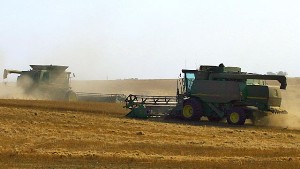In the future, the commercial farms could possibly be managed by robots, which would spray, identify and pick produce from plants such as peppers, grapes and apples. Researchers at Israel and Europe are working hard to achieve this as they feel the robots would come with several benefits such as protection of human workers from the hazardous effects of handling chemicals.
Moreover, by using a system of selective spraying the robots could totally reduce the usage of pesticides by almost 80%. The robots could also go to places where a sufficient number of itinerant workers was not usually found especially during harvest times.
 Modern commercial farms are already full of tractors with automated steering and machines that can milk cows and till soil. Commercial farms of the future may be staffed by robots that will identify, spray and pick individual pieces of produce from plants.
Modern commercial farms are already full of tractors with automated steering and machines that can milk cows and till soil. Commercial farms of the future may be staffed by robots that will identify, spray and pick individual pieces of produce from plants.
Scientists have been on the job of developing robots for agricultural labor for over 20 years. However they are now targeting the computers to visualize and observe like humans and to improve themselves as they learn and work. According to Yael Edan, a robotics researcher at Ben-Gurion University in Israel, the technology was ready for entry into the market and in five years the robots could be seen in the farms. The present day commercial farms already contain numerous machines such as tractors, which include automated steering and those that could till soil and milk cows. But to focus on individual vegetables and fruits is much more difficult mainly due to the ever-changing and unpredictable environment found outdoors. Every vegetable or fruit is of a different size, shape, orientation and color meaning the computer could not be programmed to locate a specific image. Also lighting conditions vary all through the day and night making the objects look different every time. Green vegetables and fruits could also resemble the leafy vines or bushes they grow on.
Edan’s team along with a Consortium of colleagues in Europe are working on an intelligent sensing system, which would boost or amplify the computer’s ability to recognize order inside the chaos of an agricultural environment. They plan to use multi-spectral cameras, which are capable of analyzing wavelengths of light that bounce off objects. They were trying to find a consistent pattern, which would inform the robot what it was observing. They also had an aim of developing a robotic brain along with other programs and sensors, which would learn from its mistakes and then improve. Edan reveals that they had an algorithm that would recognize simple shapes even if they were incomplete. This project was unique because it includes both computer learning and human vision. The robots were easily able to identify around 80 to 85% of fruits and on identifying the engineers were trying to create a grasping tool that would pick the produce with the correct force, in the right place.
Source: http://www.abcnews.go.com